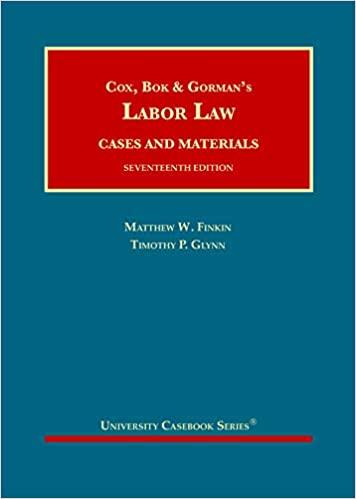Question
Schumann v. Collier Anesthesia The students were enrolled in a 28-month CRNA training program that was comprised of three semesters of classroom learning and four
Schumann v. Collier Anesthesia
The students were enrolled in a 28-month CRNA training program that was comprised of three semesters of classroom learning and four semesters of clinical experience. The students alleged that for purposes of the FLSA, they should have been considered to be "employees" of the school during their clinical rotations and thus were entitled to wages and overtime pay. A district court's grant of summary judgment, ruling that student registered nurse anesthetists ("SRNAs") could not recover unpaid wages and overtime under the Fair Labor Standards Act ("FLSA").
The college claimed that the students were not "employees" under the FLSA for a variety of reasons. First, at the beginning of their education, the students agreed that they would not be guaranteed employment as nurse anesthetists following their graduation. The school also pointed out that some surgeons and patients did not want students to be involved . The students claimed that the college benefited financially by using their services, and that they were also required to work longer hours than required by the curriculum.
The district court applied a test set forth in a 70-year-old Supreme Court opinion and found that the SRNAs were not employees for purposes of the FLSA and granted the college's motion for summary judgment.
The Eleventh Circuit did not agree with that decision. The Eleventh Circuit did not find that the SRNAs were the college's employees. Rather, it ruled that the district court erred by relying on a test that was from a 70-year-old Supreme Court opinion whose facts did not take into account a CRNA training program. Instead, the Eleventh Circuit reasoned the best way to determine whether the students were employees for purposes of the FLSA was a different, more recent test that has been developed by the Second Circuit, which takes into account modern internships. The circuit court then remanded the case back to the district court to be re-heard using the test that has been developed by the Second Circuit.
Question :
this case , looks at whether student registered nurse anesthetists in a masters program at Wolford College who were required to participate in a clinical program at a various hospitals and clinics, were entitled to unpaid wages and overtime under the FLSA. Do you agree with the courts holding in this case and state your legal analysis rationale for your position?
Step by Step Solution
There are 3 Steps involved in it
Step: 1

Get Instant Access to Expert-Tailored Solutions
See step-by-step solutions with expert insights and AI powered tools for academic success
Step: 2

Step: 3

Ace Your Homework with AI
Get the answers you need in no time with our AI-driven, step-by-step assistance
Get Started


